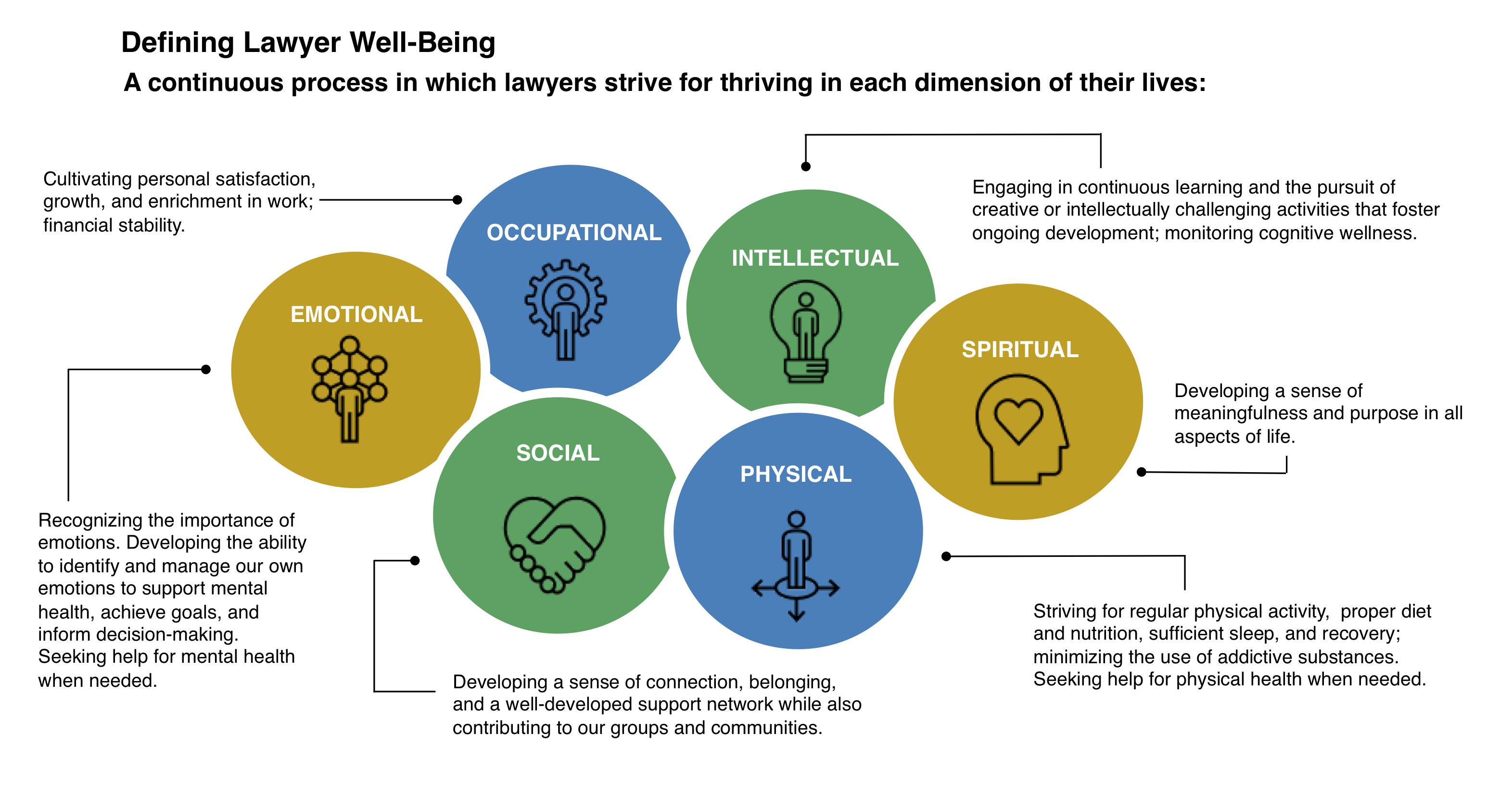Attorney well-being is a topic of great focus today, and with good reason. Attorneys suffer from very high rates of substance abuse, depression, anxiety, and suicide, and a recent Harvard Business Review article rated law the loneliest profession. This may not surprise you—perhaps you or a colleague is hurting.
But we owe it to ourselves and our profession to find answers so that we can, first, ensure those who are in crisis mode receive the immediate help and attention they need, and, second, adopt preventive measures to help change the statistics.
When we talk about “attorney well-being,” what do we mean? “Well-being” and “wellness” are thrown about a lot, and becoming more integrated into conversations around the practice of law, but not everyone means the same things. Well-being is more than ergonomic desks, step challenges and meditation programs (though I’m supportive of all three of those initiatives!). So here, I propose a framework for thinking about well-being in the context of work and the practice of law.
The ABA’s National Task Force on Lawyer Well-Being released a report in 2017 on the state of wellness in our profession. They defined lawyer well-being as “a continuous process in which lawyers strive for thriving in each dimension of their lives.”

One way to think about well-being is that it involves the intentional balancing and prioritization of the various spheres of our lives. At different times in our lives, different spheres of our existence take center stage, but they all work together to provide a picture of our whole selves. As lawyers, our focus will naturally be on occupational well-being—are we happy in our jobs, and feeling engaged and rewarded? We’ve chosen careers that might be high on intellectual stimulation, but may be lower, for example, in spiritual or physical stimulation. Alternatively, if you were a professional tennis player, your occupational and physical well-being might be very pronounced, and perhaps spiritual, too—but your intellectual or social spheres might not be naturally as pronounced.
When we talk about well-being, then, we’re talking about the process of finding the right balance for each of us across all of these spheres. Understanding how your occupation fits with the rest of your life—and how the rest of your life helps compensate for the things you DON’T get from practicing law—is at the core of this concept.
Now, a lot of people think about well-being as the opposite of being “in crisis.” Put differently, when we talk about being “well,” the implicit binary contrast is that we must be either “well” or “unwell” at a moment in time. So when a lot of organizations tout their wellness programs, they are really talking about their referral and treatment programs to prevent suicide prevention and substance abuse. Obviously, that’s of paramount importance—but I’m going to propose that the scenario is not quite that simple or stark. In reality, we spend the vast majority of our time—we hope—NOT in crisis. So instead of thinking of wellness as a binary 0 or 1 choice, let’s think about wellness on a spectrum between -10, crisis mode, and 10, a situation where we’re thriving or flourishing, where, like Emmett in the Lego Movie, “everything is awesome.” If we think about it that way, our well-being spectrum looks more like this:
On this spectrum, where we aren’t “well” or “unwell,” most of us probably spend the majority of our lives in a situation where things are basically good, but there are things we’re bothered by, hurdles or stresses, competing concerns in those different spheres of life. We’re probably in the zero to two range most of the time. Why? Well, maybe your job is great but your marriage is going through a rough patch. Or perhaps your kids are a source of great happiness, but your mom needs constant care. Or maybe you just got back from a great vacation only to be reminded that your house needs a major repair. Things are good, all things considered, but there are certainly areas that could be improved. It’s, you know – life.
When we talk about well-being, we need to talk about more than getting people out of crisis. We need to talk about how to help everyone with tools that promote awareness, efficacy and engagement so that we can fine-tune our lives and get closer to that “everything is awesome” condition. When we do that, we will be happier, and when the inevitable curveballs of life come our way – we lose a case, we have a personal setback, or (heaven forbid) the Eagles lose a football game – we have built up some resilience through preventative maintenance. At those times, we want to make sure we don’t slide from -3 to -9, but instead from 2 to -2 or -3, and then we can climb back more readily to the positive numbers.
Thinking about well-being as the intentional prioritization and organization of things that are important to us, and remembering that well-being is not a difference between “well” and “unwell,” but, instead, is a spectrum where we are rarely experiencing perfection, but equally rarely experiencing devastation, can help put bad days in perspective. In the end, it’s rarely as good or as bad as it seems—and that balance can be reassuring and empowering.
For more about well-being for attorneys, take a look at ALM's "Minds Over Matters" series, where I'm proud to be an advisor:



Comments